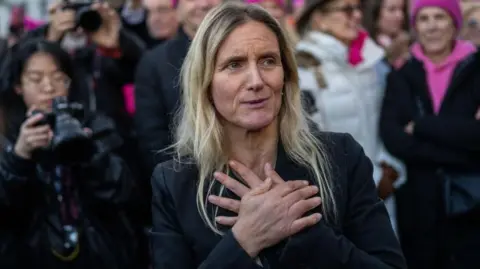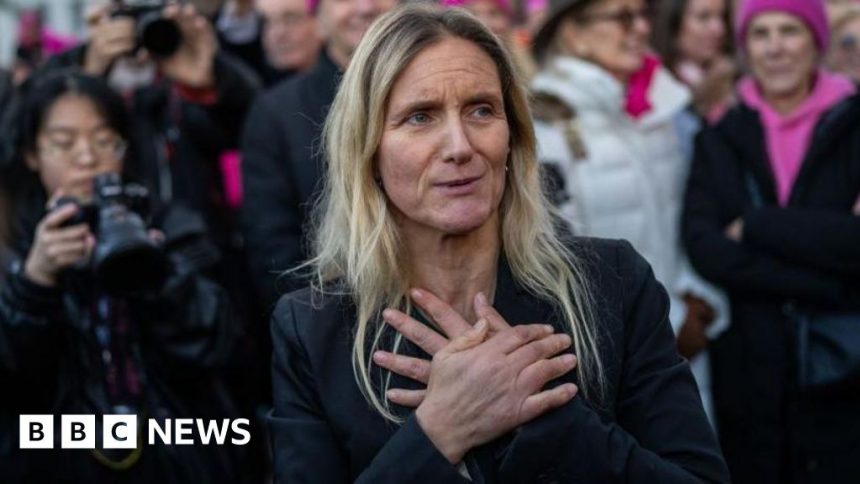MP abuse worse than Jo Cox era, says sister Leadbeater
Kim Leadbeater, the sister of murdered MP Jo Cox, has said MPs now face more severe abuse than when her sister was killed.
Cox was murdered in her constituency of Batley and Spen by a terrorist in the run-up to the 2016 Brexit referendum.
Despite calls for change following the murder, Leadbeater said there had been an erosion in people’s ability to “disagree well”.
Speaking to Nick Robinson’s Political Thinking podcast, she argued “the level of abuse and nastiness” in political debate was “worse than ever”.
Leadbeater, now Labour MP for her late sister’s constituency, said proposing her bill to legalise assisted dying had exposed her to a level of abuse she had never endured before.
“I think we can have a civilised, respectful politics, and we can still disagree well and robustly and have proper passionate debate,” Leadbeater said.
“But I just think sometimes we have lost that balance of disagreeing well and having that debate.”
“Then it descends into personal insults, threats, abuse, intimidation – and that’s when I worry.”
Talking about sending supportive messages to her sister in the days before her death, Leadbeater said: “There was a level of abuse and there was a level of nastiness in politics at that time – nowhere near like it is now.
“I remember Jo saying to me ‘I need to get a thicker skin’.
“And I pushed back and said ‘No you don’t. You need to be you because that makes you the brilliant individual that you are, and it makes you the brilliant MP that you are.’
“And do you know what’s really sad, Nick? I actually have that conversation with colleagues now on a daily basis.
“Generally female colleagues, but colleagues across the political spectrum, because the level of abuse and nastiness now is, I would say, worse than ever.”
MPs are currently examining Leadbeater’s Terminally Ill Adults (End of Life) Bill, which would grant people in certain circumstances the right to seek help to end their own life.
Asked by Nick Robinson if proposing the bill had exposed her to a level of abuse she had never previously lived through, Leadbeater said: “Yeah, absolutely.
“I kind of knew it would because I know what a serious issue it is, and I know how strongly people feel about it.
“There are people on the extremes of the debate, people who do not want to see any version of a change in the law, and there are people on the other extreme of the debate who would want a much broader law.
“Sadly, that has led to more abuse than I’ve probably had on anything.
“The abuse is one thing, but it’s when people say things that are not true that I really struggle with.
“The misinformation and the disinformation aspect of it – and the fact that a lot of that takes place on social media where there’s no room for a nuanced debate.”
But Leadbeater said she understood the “passion” around the debate and vowed to “continue to work as hard as I can to make sure that the genuine concerns that are there are considered” as the bill went through Parliament.
 Getty Images
Getty ImagesIn November, MPs backed Leadbeater’s bill to legalise assisted dying in England and Wales by 330 to 275 in a free vote – meaning MPs were allowed to vote with their conscience, rather than following party orders.
It was the first Commons vote on the issue in nearly a decade and paved the way to a monumental shift in the law.
Leadbeater said she was “under no illusion how big a deal this is”.
“We will take oral evidence from over 50 witnesses, which is highly, highly unusual for a private members bill,” she said.
This week, the first stages of line-by-line scrutiny of the bill sparked heated debate, with accusations of bias towards pro-assisted dying voices.
But Leadbeater argued she had taken “a really open approach” to the bill, welcoming amendments.
“It is upsetting and disappointing sometimes to people who are suggesting otherwise – because we’ve got to get this right,” she said.
“It is not just about passing the law, it’s about passing good law that achieves what we are trying to achieve but does not create other problems and takes into account everybody’s views.”
The bill’s committee will begin its first oral evidence session on 28 January.
There are still many months of parliamentary activity ahead, and the bill must pass votes in both the Commons and Lords before the proposed changes can become law.








